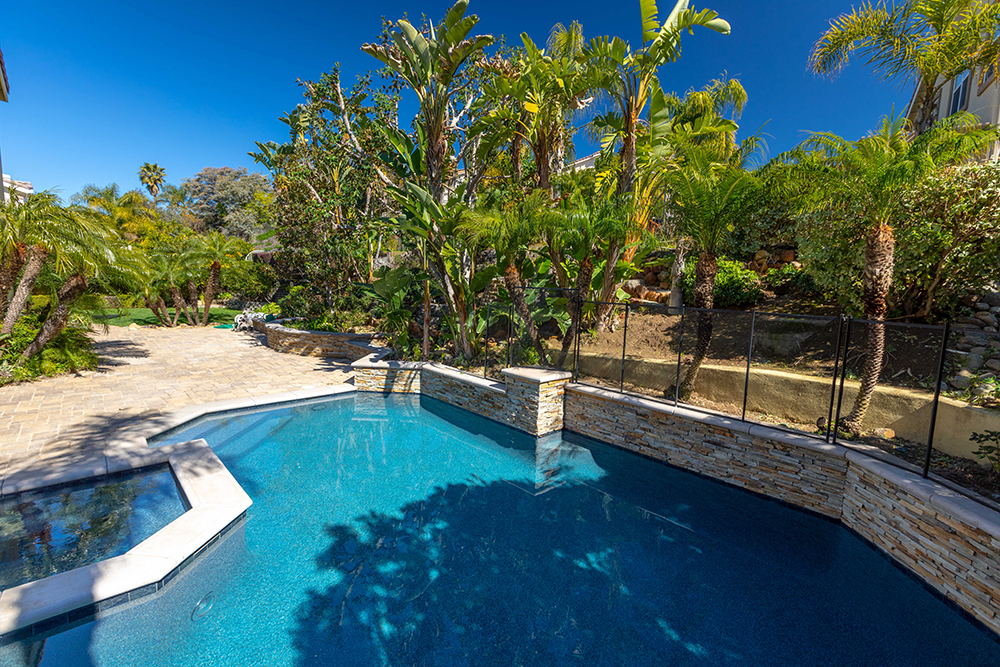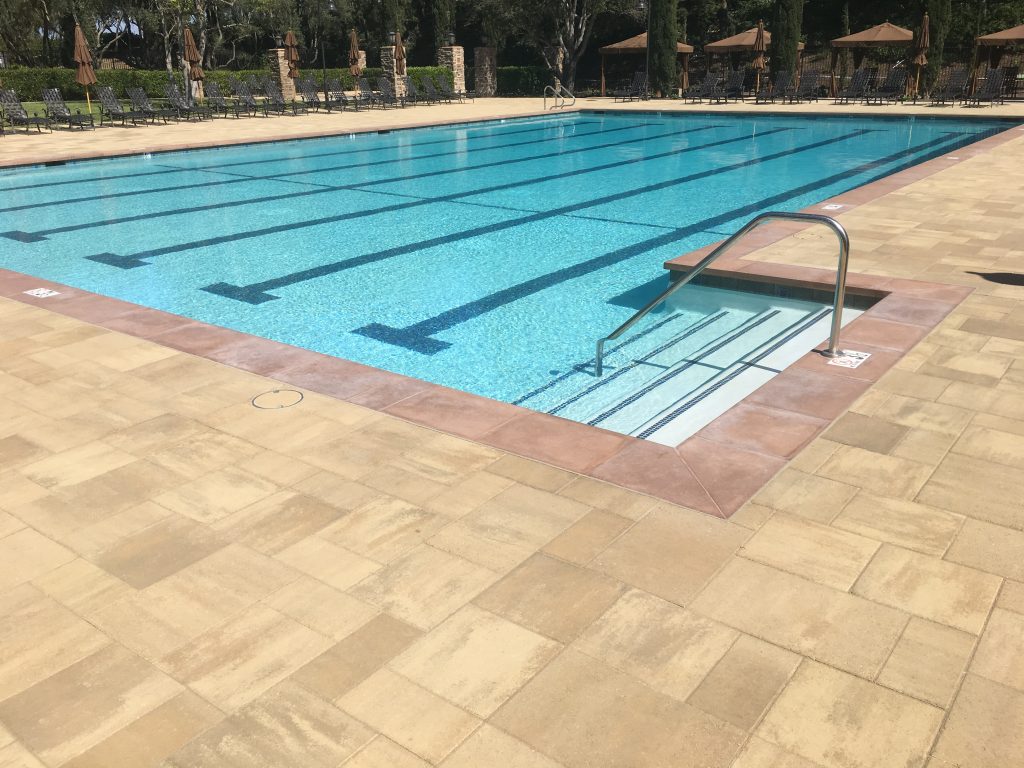When it comes down to choosing or maintaining your pool decking, the main considerations include: lifespan, curb appeal and safety.
As an extension to your home’s outdoor space, the pool deck is a place to be enjoyed, all year long. It also contributes to your pool’s beauty and home’s resale value.
Pool decking allows for a lot of design flexibility based on your preferences. Depending on the shape, size, and material, your decking enables you to create a unique look for your entire poolscape.
Considerations for Your Deck Material Options
 With so many decking materials available, making the best choice is often tough. Some standard options include concrete, wood, composite wood, stone, pavers, tile decks and more in different shapes, sizes, and colors. Before making a decision, ask yourself these questions:
With so many decking materials available, making the best choice is often tough. Some standard options include concrete, wood, composite wood, stone, pavers, tile decks and more in different shapes, sizes, and colors. Before making a decision, ask yourself these questions:
- Do I want a specific pool design theme?
- What look do I want to achieve?
- Which material fits my style?
- Will this material amplify the overall look?
- Can I walk barefoot on the deck comfortably?
- Is there a chance I will slip on the wet surface?
- Does the deck surface get hot in the sun?
You might want to look into heat-resistant deck materials in lighter colors because they will absorb less heat. Light colors work in areas like California or Florida because the temperatures get toasty and you need a cool pool deck.
If you choose a textured material, it will be slip-resistant while wet. However, it should not be so hard that you cut or scrape your feet when you walk barefoot.
Apart from these, you also want the pool decking to be attractive, within your budget, durable, and easy to maintain.
“Pool decking adds character to your backyard oasis.”
Pool Decking Materials
Concrete
Concrete is one of the most popular pool decking materials, as it is easier to install and take care of. Still, this traditional pool deck option does not have to be boring or routine. You can spice up the salt finish concrete to personalize your pool deck with different colors. Not only that, but concrete also allows you to experiment with its texture and finish.
Pros:
- Cost-effective
- Durable
- Easy to install
- Little maintenance
- Available as pre-fabricated pavers
- The surface doesn’t get too hot
- Comfortable to walk on
Cons:
- Stamped concrete has a smooth surface and is a bit slippery. For this reason, you can add textures, patterns or pebbles and make the surface slip-resistant.
Wood
 Wood is also another popular material for pool decks, both for in-ground and above-ground swimming pools. They are available in many varieties, designs, and patterns. You’ll want to make sure the pool decking you choose is a good choice for your budget, location, and climate.
Wood is also another popular material for pool decks, both for in-ground and above-ground swimming pools. They are available in many varieties, designs, and patterns. You’ll want to make sure the pool decking you choose is a good choice for your budget, location, and climate.
Some are naturally resistant to mold, mildew, or insects. Wooden pool decks look elegant and evoke a natural look.
Pros:
- Comes in many colors, patterns, and types
- Comfortable to walk on
Cons:
- Seasonal cleaning, sanding, and sealing
- Regular maintenance since it often comes in contact with water
- Can be slippery without subtle texturing
- Can get damaged with extreme weather
- You could hurt yourself with tiny splinters sticking out on the deck
- Might be quite expensive, depending on what you choose
“If you need a classy and alluring pool deck, choose natural stone.”
Stone
Stone is a natural material that can enhance your pool landscape and the architectural features of your home. Though it is natural, not all rocks are rough on the surface. Most pool decks made of stone have flagstones and are slip-resistant. One key point to mention here is that you can get the material locally from nearby stone quarries. That means you might also save up on the shipping costs you have to deal with if you choose other materials.

Pros:
- Natural look
- Plenty of flexibility
- Special look to your pool
Cons:
- Stones in darker colors get hot in the sun
- Inexpensive stone can look cheap and tasteless
“With marble, brick, or stone pavers, you can create a resort style ambiance in your home.”
Pavers
Pavers are individual pieces which you can install easily for your pool decking. They are highly durable and suit almost any design. In case there is any plumbing repair, and you need to remove a part of the deck, it is easier to remove and replace individual pavers. They are also available as brick, stone, travertine, and porcelain pavers.
Pros:
- Offer a sleek look to the deck
- Heat-resistant
- Durable
- Long life
- Come in many colors and designs
Cons:
- Need more maintenance
Tiles
 Another popular choice of pool deck material is tile decking. Tiles are easy to maintain and are customizable to suit the style of your pool.
Another popular choice of pool deck material is tile decking. Tiles are easy to maintain and are customizable to suit the style of your pool.
If you want something economical, yet pleasing to the eye, then tiles are what you might consider.
Pros:
- Longevity
- Ease of maintenance
- Perfect budget option
Cons:
- Highly glazed tiles can be slippery when wet. Instead, you might choose water-impervious porcelain tiles that can provide better traction.
Visit Alan Smith Pools for Samples of Different Pool Decking Options
Whether you need a new pool decking or a coating overlay, get it done right with Alan Smith Pools. For your pool construction, remodeling, or installation needs, call our expert team at (714) 909-1392. Or contact us online to get a free estimate.
How to Choose Pool Decking | Alan Smith Pools – Orange County, CA







